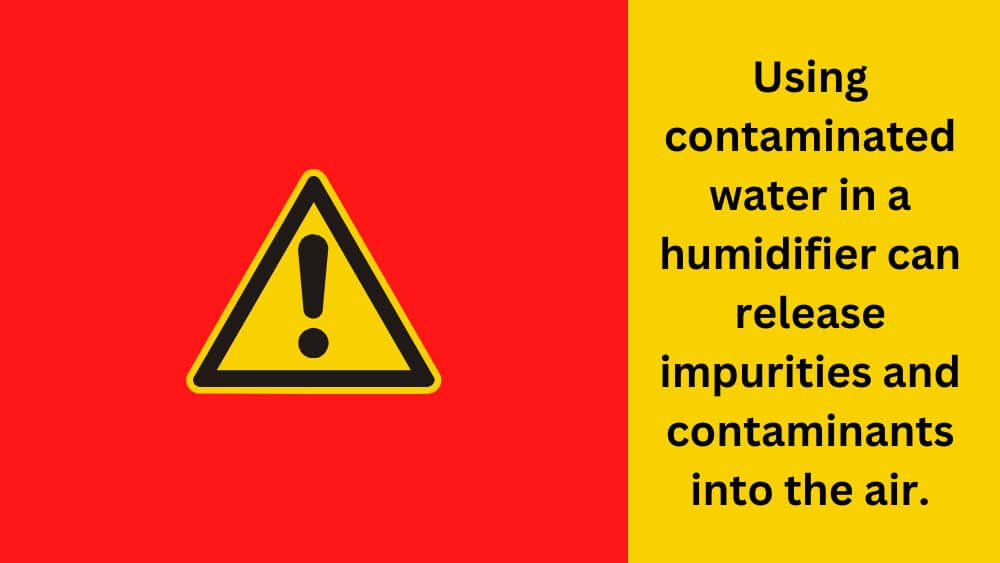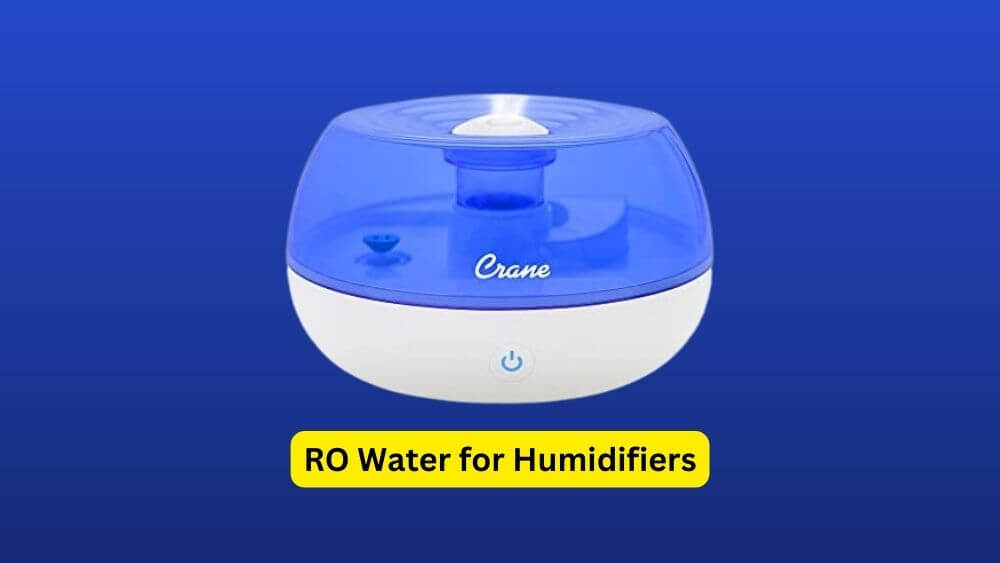This question has generated a fair amount of debate, as there are potential benefits and drawbacks. Yes! Reverse osmosis water is the best option for use in the water humidifier. But definitely, you need clarification.
In this blog post, we’ll take a closer look at the pros and cons of using RO water in a humidifier, as well as some options for addressing the potential drawbacks and alternative water sources that may be more suitable for use in a humidifier.
Introduction
Let’s start by defining reverse osmosis water. It’s a filtration process that filters out any impurities and contaminants from the water. The membrane forces them out, resulting in super-purified water with most of its minerals missing.
Let’s turn to the debate about using RO water in humidifiers. On the one hand, the lack of impurities and contaminants in RO water can be a significant benefit, as it can help prevent build-up in the humidifier and ensure it is functioning correctly.
On the other hand, the lack of minerals in RO water can also be a drawback. It can make the water more corrosive and potentially minor damage the humidifier over time. Honestly, it is not a big deal!
How Do Water Humidifiers Work
Water humidifiers release moisture into the air to increase the humidity level in a room or area. Several different types of humidifiers, including ultrasonic, evaporative, and impeller models, operate on the same basic principle.
Here’s how they work:
- Water is added to the humidifier’s reservoir.
- The humidifier’s internal mechanism, such as an ultrasonic vibration plate or a fan, breaks the water down into tiny droplets.
- The tiny droplets of water are released into the air as a fine mist.
- The mist evaporates into the air, increasing the humidity level in the room.
Some humidifiers also have additional features, such as a built-in filter or a mineral cartridge, that can help to improve the quality of the water and the air being released. Humidifiers may also have adjustable settings that allow you to control the level of moisture being released into the air.
Many humidifiers, especially cool-mist or ultrasonic types, take water and convert it into a mist released into the air. If that water contains minerals, those minerals may stay behind as residue (“white dust”) or scale, or even get aerosolised.

Benefits of using RO water in a humidifier
One of the significant benefits of using RO water in a humidifier is that it is free of impurities and contaminants. This is especially important for people with allergies or respiratory issues, as these contaminants could worsen their symptoms. In addition, the absence of impurities and pollutants can help prevent build-up in the humidifier and ensure it is functioning correctly.
Free of impurities and contaminants
One of the significant benefits of using RO water in a humidifier is that it is free of pollutants and contaminants. This can be especially important for people with allergies or respiratory issues, as these contaminants could potentially worsen their symptoms.
Helps to prevent build-up in the humidifier
The absence of impurities and contaminants in RO water can help prevent build-up in the humidifier and ensure it functions correctly.
Safe for use in all types of humidifiers
RO water is safe for all humidifiers, including ultrasonic, evaporative, and impeller models.
Can help to extend the lifespan of the humidifier
Because RO water is free of impurities and contaminants, it can help to prevent build-up in the humidifier and extend its lifespan.
Highly purified
RO water is highly refined and has had most of its minerals removed, which can provide peace of mind for those concerned about tap water quality.
Drawbacks of using RO water in a humidifier
While the lack of impurities and contaminants in RO water can be a significant benefit, it can also be a drawback. Because RO water has had most of its minerals removed, the lack of minerals may make it less effective at increasing humidity in the air, as the minerals can help to increase the water’s ability to hold onto moisture.
Options for addressing the drawbacks of using RO water in a humidifier
If you decide to use RO water in your humidifier, there are a few options for addressing the potential disadvantages. Let’s check the alternatives at a glance-
Option 1
One option is to use a humidifier that has a built-in mineral cartridge. These cartridges can help to add back some of the minerals that are removed during the reverse osmosis process, which can help to increase the water’s ability to hold onto moisture and reduce the risk of corrosion or scaling.
Option 2
You can use a humidifier specifically designed for use with RO water. These humidifiers are typically made with materials resistant to corrosion and scaling. They may also have features that help to balance out the lack of minerals in the water.
Option 3
You can use remineralized RO water in your humidifier. There is an RO system available with a built-in mineral filter. It is okay to use remineralized RO water. If your RO system does not have any mineral filter, you can use additional mineral drops to remineralize RO water. Now use it as your humidifier and stay relaxed.
Cost considerations of using RO water in a humidifier
When using RO water in a humidifier, it’s worth considering the cost. Reverse osmosis systems come with some upkeep, like replacing the filters and membranes, which can add up over time. Plus, purifying the water takes energy, which could show up on your monthly bills.
Alternative water sources for humidifiers
Of course, it’s also worth considering other water sources that may be more suitable for a humidifier. For example, some people use distilled water, free of impurities and contaminants but still contains some minerals.
Others opt for tap water that has been filtered using a different method, such as carbon filtration or UV purification. These options can provide some benefits of using RO water, such as the absence of impurities and contaminants, while also retaining some of the minerals that can help increase the water’s ability to hold onto moisture. But remember, carbon and UV filtration are not as pure as RO water.
Because RO water has far fewer dissolved minerals than tap water, using RO water tends to reduce the amount of white dust, mineral buildup in the tank or components, and airborne mineral particles. For example: one guide says that RO water “can also be used safely in humidifiers” because it is ~98% free of dissolved impurities

FAQS
When used in a humidifier, does reverse osmosis water cause allergies?
No evidence suggests that reverse osmosis (RO) water can induce an allergic reaction when used in a humidifier. Some people may find that using RO water in their humidifier can help alleviate allergic reactions or respiratory issues, as it is free of impurities and contaminants that could worsen these symptoms.
However, other factors related to using a humidifier, such as mold or bacteria growth within the device, could potentially induce an allergic reaction. To minimize the risk of allergic reactions or respiratory issues, it is essential to regularly clean and maintain your humidifier to ensure it is functioning correctly and free of contaminants. Consult a healthcare professional for guidance if you are concerned about the potential for allergic reactions or respiratory issues.
RO Water vs Distilled Water vs Rainwater which is better for a humidifier?
You can use distilled water, reverse osmosis (RO) water, and rainwater in a humidifier. The main difference between these three is the way they are purified. RO, distilled, and rainwater have low TDS (Total Dissolved Solids). RO water has only 3% TDS, and rainwater and distilled water are closer to zero TDS.
Distilled water is made by boiling water and collecting the steam, which leaves behind impurities and minerals. This makes it a good choice for a humidifier because it can help prevent the buildup of minerals, which can clog the device and shorten its lifespan.
On the other hand, RO water and rainwater are also free from impurities and minerals. So you can use either type of water in a humidifier, but it is essential to use clean, purified water to help prevent the buildup of scale and maintain the health and performance of the device.
What type of water should we not use in a humidifier?
Several types of water should not be used in a humidifier, including tap water, hard water, water with a high mineral content, water with a high pH, and water with a strong odor or taste.
Tap water: Tap water can contain minerals, chlorine, and other impurities that can build up inside the humidifier and reduce its effectiveness.
Hard water: Hard water is high in minerals such as calcium and magnesium, which can leave deposits inside the humidifier and clog the device.
Water with a high mineral content: Well water, which has a high mineral content, can leave deposits in your humidifier and make it run less efficiently.
Water with a high pH: Water with a high pH (alkaline water) can damage the humidifier and reduce its effectiveness.
Water with a strong odor or taste: If your water has a strong smell or taste, like from a natural spring, it can impact the air quality of the humidifier.
What are the harmful effects of using contaminated water in a humidifier?
Suppose you’re using contaminated water in your humidifier. In that case, it can mess things up – it can reduce effectiveness, clog and scale up, pose a health risk, and even damage the humidifier. It’s essential to use clean, purified water instead to avoid these problems and keep your humidifier in tip-top shape.
Reduced effectiveness: Contaminated water can contain impurities and minerals that can build up inside the humidifier and reduce its effectiveness.
Clogging and scaling: Contaminated water can leave deposits inside the humidifier, leading to clogging and scaling. This can reduce the performance of the device and shorten its lifespan.
Health risks: Using contaminated water in a humidifier can release impurities and contaminants into the air, which can be inhaled and cause respiratory issues or other health problems.
Damage to the humidifier: Contaminated water can cause damage to the humidifier, such as corrosion or other issues.
Conclusion
In the water humidifier, reverse osmosis water is the ideal option. Regardless of which water source you choose, it’s always a good idea to regularly clean and maintain your humidifier to ensure it functions properly and effectively. By taking good care of your humidifier, you can help extend its lifespan and ensure that it provides maximum benefits for you and your family

Hasan Al Sarker is a Reverse Osmosis Specialist. He has worked for many years to ensure safe drinking water for all. His research paper has been published in several journals, including Issue, Medium, and Slideshare. He is recognized as a water doctor among specialists though he did not attend medical college.
Besides working as a researcher of reverse osmosis technology, he is also very fancy with the kitchen and cooking. His guides are reading thousands of people every day. As a head of content, he is responsible for all the published articles at RO System Reviews.

